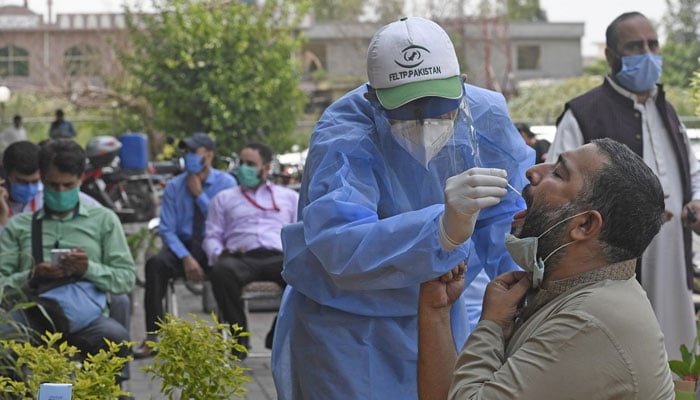Pakistan logs over 760 COVID-19 cases, eight deaths in 24 hours
COVID-19 positivity rate in Pakistan stands at 3.65%
ISLAMABAD: Pakistan recorded eight COVID-19 deaths during the past 24 hours — the highest number of virus-related causalities in the last 20 days, data from the National Institute of Health showed Thursday.
The country last reported nine deaths in a single day on July 7.
As per the latest stats, the COVID-19 positivity rate in Pakistan stands at 3.65%. As many as 761 new COVID-19 infections were detected after testing on 20,843 samples, taking the country's total coronavirus case count to 1,552,632.
Meanwhile, 170 people suffering from the virus are being treated in critical care units.
Latest coronavirus variant
BA5, part of the Omicron family, is the latest coronavirus variant to cause widespread waves of infection globally.
According to the World Health Organisation’s most recent report, it was behind 52% of cases sequenced in late June, up from 37% in one week. In the United States, it is estimated to be causing around 65% of infections.
Rising case numbers
BA5 is not new. First identified in January, it has been tracked by the WHO since April.
It is a sister variant of the Omicron strain that has been dominant worldwide since the end of 2021 and has already caused spikes in case rates – even with reduced testing – in countries including South Africa, where it was first found, as well as the United Kingdom, parts of Europe, and Australia.
Coronavirus cases worldwide have now been rising for four weeks in a row, WHO data showed.
Like its closely related sibling, BA4, BA5 is particularly good at evading the immune protection afforded either by vaccination or prior infection.
For this reason, “BA5 has a growth advantage over the other sublineages of Omicron that are circulating,” Maria Van Kerkhove, the WHO’s technical lead on COVID-19, told a news briefing on Tuesday.
For many people, this means that they are getting re-infected, often even a short time after having COVID-19. Van Kerkhove said the WHO is assessing reports of re-infections.
“We have ample evidence that people who’ve been infected with Omicron are getting infected with BA5. No question about it,” said Gregory Poland, a virologist and vaccine researcher with the Mayo Clinic in Rochester, Minnesota.
-
Can brain stimulation make people kinder & less selfish? New study offers hope
-
Mariah Carey details 'hardest' bipolar disorder experience
-
Pink reveals health routine for asthma management
-
Gigi Hadid talks about 'relieving tension' amid having Hashimoto's disease
-
Selena Gomez explains why she thought lupus was 'life-or-death'
-
How Kim Kardashian made her psoriasis ‘almost’ disappear
-
Nick Jonas gets candid about his type 1 diabetes diagnosis
-
Sir Jackie Stewart’s son advocates for dementia patients












